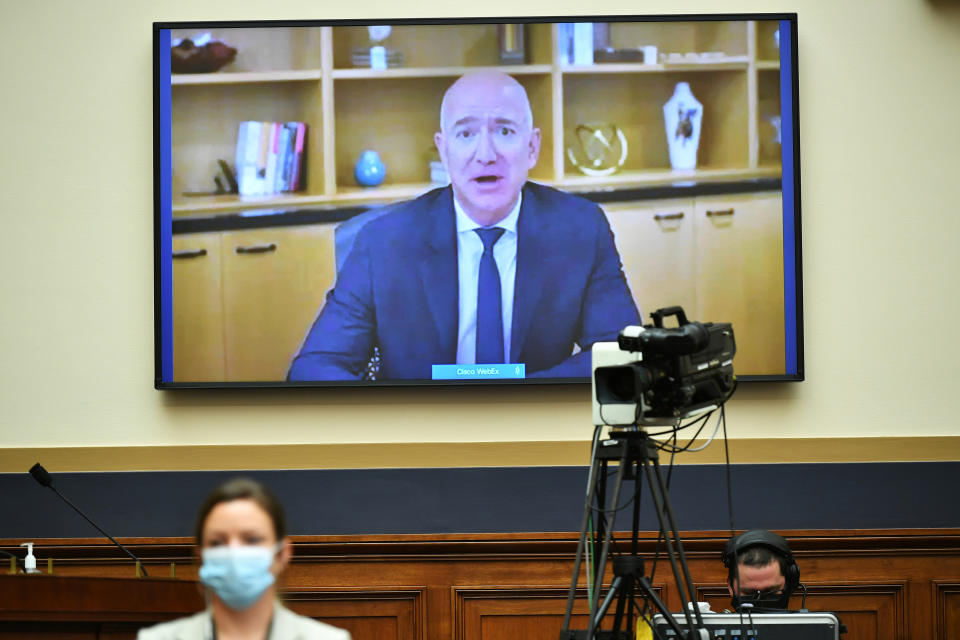'Dangerous for democracy': Big Tech hearing gives clues on future of antitrust law
In the last of seven hearings to investigate concerns that Google parent Alphabet (GOOG, GOOGL), Facebook (FB), Amazon (AMZN) and Apple (AAPL) are operating as illegal monopolies, witnesses before the House Antitrust Subcommittee Thursday clashed on whether Congress should overhaul U.S. antitrust law.
Proposals from witnesses before the committee, including several antitrust experts, could be a clue to changes forthcoming from the committee. They ranged from introducing legislation that would break up Big Tech companies and overturn judicial precedent to increased funding for antitrust law enforcers to maintaining status quo.
‘Quintessentially a congressional job’
Zephyr Teachout, associate professor of law at Fordham University School of Law, told the subcommittee on Thursday that Congress, not the Supreme Court, should regulate Big Tech. “It is quintessentially a congressional job to respond to this threat,” Teachout said, calling for “significant” new legislation.

Michael Kades, director of markets and competition policy for Washington Center for Equitable Growth, also called for legislative reform, arguing that the filing of one or two cases would fall short of addressing the current level of anticompetitive conduct.
“Unless Congress acts it is accepting...that antitrust laws have little power to stop or deter anticompetitive conduct,” Kades said.
When acting to regulate Big Tech, Teachout argued, Congress should limit certain large companies to a single line of business, preventing Amazon, for example, from controlling businesses for online commerce while also controlling shipping and fulfillment. The approach would similarly impact Google’s ability to control platforms that both serve and sell online advertisements.
“Amazon takes as much as 30% of every sale,” Teachout said about seller transactions on the marketplace. “This is essentially a form of private tax...and that's really dangerous for democracy.”
University of Pennsylvania Carey Law School professor Christopher Yoo disagreed with this notion, arguing that restricting companies to a single line of business would cut against a central purpose of antitrust laws: to protect consumers. Dismantling the efficiencies of Amazon’s vertical integration, he said, would lead to higher consumer prices.
More modest proposals to change antitrust law
Meanwhile, William Baer, visiting fellow for governance studies at Brookings Institution, proposed “modest” changes to antitrust laws — including altering the legal standard of proof required for the government to prevail on antitrust actions. The standard, he said, is problematic because it often dissuades the Justice Department from challenging mergers or acquisitions, such as Google’s purchase of ad platform DoubleClick in 2007 and Facebook’s acquisition of photo-sharing site Instagram in 2012.

“Many courts demand a level of proof that is often unattainable that chills enforcement and limits our ability to challenge conduct of acquisitions of potential rivals, especially in the tech sector, where firms benefiting from network effects can acquire market power,” Baer said.
The DOJ’s antitrust division, tasked with overseeing increasingly more transactions on a smaller budget, also needs more funding, according to Baer.
Not every witness was primarily concerned with antitrust enforcement. Rachel Bovard, senior director of policy for Conservative Partnership Institute, argued that laws already in place are equipped to tackle violations as they exist in the tech sector. Instead, Bovard argued that the more important concern for lawmakers should be ensuring that Big Tech platforms refrain from using market dominance to censor conservative speech.
“Single algorithmic decisions made by individuals in a private corporation accountable to no one changes what kind of viewpoints and information are available to billions of people around the world,” Bovard said.
‘Gatekeepers’ that pick winners and losers
The subcommittee’s investigation, started in June 2019, has run alongside antitrust investigations by federal agencies and comes amid reports that the U.S. Department of Justice is prepared to bring legal action against Google over its search and advertising market dominance.
Committee Chair, Rep. David Cicilline is expected to issue a final report on the investigation as soon as next week, suggesting recommendations for legislative and regulatory changes.
During Thursday’s hearing, Ciciline said the subcommittee's investigation found that each Big Tech platform serves as a “gatekeeper” that controls access to markets and picks winners and losers.
“By controlling the infrastructure of the digital age they have surveilled other businesses, identified potential rivals, and ultimately bought out, copied, or cut off their competitive threats,” he said.
Alexis Keenan is a legal reporter for Yahoo Finance and former litigation attorney.
Follow Alexis Keenan on Twitter @alexiskweed.
Read more:
How Donald Trump and other real estate professionals get away with paying ‘zero tax’
Nikola could find itself in legal trouble if short seller claims are true
Labor Department proposes definition for independent contractors for the first time ever
Short seller rejects Nikola’s explanation as ‘tacit admission of securities fraud’
Large-scale airline layoffs could cause ‘great, great economic harm’
Follow Yahoo Finance on Twitter, Facebook, Instagram, Flipboard, LinkedIn, and reddit.
